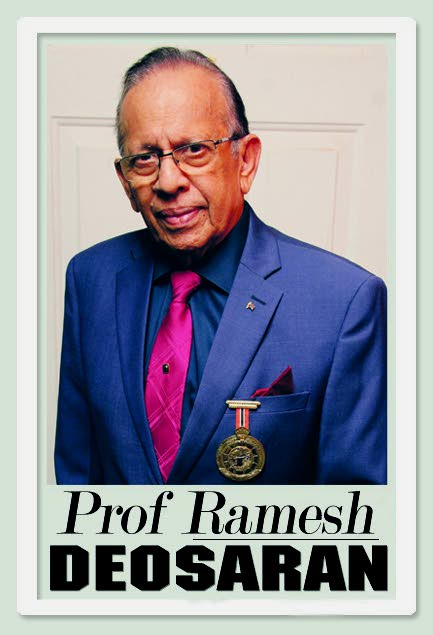Rafeeq, Panday and a crime plan

While there is still some chewing over the late Basdeo Panday’s life, up came former health minister Dr Hamza Rafeeq’s letter two weeks ago about his experience with PM Panday. Rafeeq’s story is also about party politics.
He celebrated Panday’s concern for the poor by stating: “Panday’s deep concern for the less fortunate manifested in various measures, including the importation of used cars…It afforded many who could have only dreamt of purchasing a car with the opportunity to own their own vehicle.”
Dr Rafeeq had a gentle but very enlightening disposition, similar to that of current Fyzabad MP Dr Lackram Bodoe. Incidentally, is the bright, gentlemanly medical practitioner Dr Bodoe still the shadow health minister in Ms Kamla Persad-Bissessar’s shadow cabinet? MP Dr Rafeeq served as minister and health spokesman.
Celebrating PM Panday again, Dr Rafeeq stated: “Mr Panday enacted four pieces of ground-breaking legislation: The Integrity in Public Life Act, the Judicial Review Act, the Freedom of Information Act and an act providing for Ministries and State Enterprises to be scrutinised by committees of Parliament.”
These acts really helped push democracy on wheels. The Equal Opportunity Act, however, faced some challenges. Looking back, it is a pity that Mr Panday didn’t listen more carefully to the concerns of Messrs Ramesh Maharaj, Ralph Maraj and Trevor Sudama. Party leaders should know by now it is not enough to say “Take it to the police.”
Dr Rafeeq’s letter reminded me of several Panday-related events. Panday, never one to put water in his peppery mouth, left us with two memorable remarks. One, “politics has its own morality,” and two, after Patrick Manning’s passing: “We are a nation of hypocrites.” These remarks are intriguing because they get manifested no matter how much, with good intentions, we try to suppress them. It is so much of what we really are.
It is really not “politics.” It is more precisely “party politics.” Early last month, I stated: “Politicians face the masses’ immoral inclinations, a multitude of self-interest groups and political competitors wherein truth becomes a casualty. Moral flexibility is adopted for political survival.” We have learnt to live with it.
Rafeeq recalled that during his stint as health minister, he complained to PM Panday about “the problems faced in the health sector with the public servants and the newly created regional health authorities.” The politically-savvy Panday replied: “Minister, the people elected you to solve their problems, not to listen to yours.” Good advice for all PMs. Panday further warned: “A government has finite resources to satisfy the infinite demands by the population. Prioritise.”
Maybe after retirement, both Dr Rowley and Ms Persad-Bissessar should tell us about their leadership experiences. Political parties surrender their intellectual base for day-to-day political expediency and survival. This was Dr Eric Williams’ experience as he later preferred to hide and quietly write, leaving much work to Dr Cuthbert Joseph.
Panday was interviewed in 2017 by the Police Management Audit Committee. It was remarkable how the committee members went to greet, shake hands, take pictures etc, with him after the lengthy session.
For me, I met Mr Panday several times before – when he was ULF Leader, as PM and as a reflective citizen. Each time he was gracious and so intellectually alive. When crime was hitting the country hard, I remember taking a 12-member international team with a holistic anti-crime plan (for all ministries, and agencies) to him as PM in 1996. The plan was titled “A National Action Plan Against Crime,” subtitled “Causes, Prevention, Management and Training.” The government’s help was needed to develop and implement the plan.
With several ministers, he graciously accepted the plan, but as party politics go again, it was left idle in cabinet. No help came. Panday called me and quietly apologised. Like Dr Rafeeq’s recollection, it is public education to know the history so at least, the wheel will not be continuously re-invented.
Another national stalwart, Trinidad Express manager, Ken Gordon who was vice-chairman of the anti-crime team, got the entire 30-page document published in his Sunday Express. Team member Prof Daniel Maier-Katkin, dean of Florida State University School of Criminology, stated: “This is a very practical, well-rounded action plan against crime and if properly supported it could bring quite results.”
Another team member criminologist Prof Richard Bennett of American University said: “Given the complexities of crime, this professionally coordinated approach, this action plan is our best strategy.”
Even PM Panday, UWI Vice Chancellor Sir Alister McIntyre, former police commissioner Jules Bernard, teachers union, chamber of commerce, etc, all complimented and welcomed the anti-crime effort. Then we ask: What is the root cause of crime?


Comments
"Rafeeq, Panday and a crime plan"